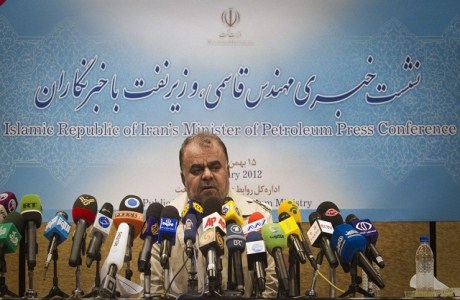U.S. Deputy Energy Secretary Daniel Poneman and Iranian Oil Minister Rostam Qasemi attended a panel at the International Energy Forum in Kuwait to discuss ways to mitigate crude-price volatility.
Brent crude has risen 17 percent this year amid supply concern as the U.S., the world’s biggest oil consumer, and Europe tighten sanctions against Iran over its nuclear program. As much as 1 million barrels a day of Iranian exports may be lost because of the measures, the International Energy Agency said in a report today.
“Unfortunately the trend of dialogue between producers and consumers has not been successful in establishing an atmosphere of healthy cooperation, depoliticizing oil and energy industries, and eliminating sanctions, to the extent that producers and consumers expected,” Qasemi said during the panel, according to a copy of his speech.
The Iranian and U.S. delegations didn’t converse directly during the session, which took place under a marquee, according to three people who attended the panel. The U.S has no formal diplomatic relations with Iran.
Iran’s buyers in Asia and the European Union have cut oil purchases to comply with sanctions and seek alternative supplies.
Saudi Arabia’s Ali al-Naimi, the oil minister of the world’s biggest crude exporter, was also on the panel, as was IEA Executive Director Maria van der Hoeven and OPEC Secretary General Abdalla el-Badri. Saudi Arabia pumped 9.8 million barrels a day last month, according to a person with knowledge of the kingdom’s oil policy.
The International Energy Forum, consisting of a group of nations that account for more than 90 percent of global oil and gas supply and demand, gathers for the second and final day in Kuwait today.
Ministers met in the session today to discuss developments in data transparency as well as energy market volatility and to offer guidance on priorities for the future, according to the agenda.
“The adverse economic, political and social consequences of the sharp swings and movements in oil prices that have characterized the market since 2008 remain a source of concern,” the agenda showed. “A common school of thought in the current debate proposes that, although price movement is a necessary element of market-making, the sharp price swings that we have witnessed in recent years are harmful.”
Brent crude for April settlement on the London-based ICE Futures Europe exchange traded at $126.07 a barrel, down 15 cents, at 2:20 p.m. in London. Brent rose to $126.22 yesterday, the highest settlement price in 11 months.



